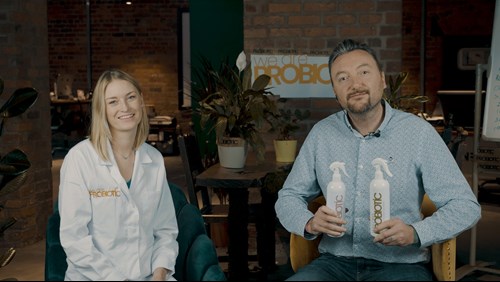Bolton firm hopes to clean up with probiotics
A Bolton SME is challenging the chemical cleaning industry by introducing a new way to clean that is eco-friendly, cost effective and sustainable.
Samantha Kitchen is flying the flag for a transition from simply 'eco-friendly' to verifiably 'earth-beneficial' cleaning products.
The Co-Founder of Bolton company We Are Probiotic wants to break into the commercial market and has embarked on a year-long research study in partnership with Manchester Metropolitan University.
As the SME prepares for the next stage of its growth, Samantha (pictured below) speaks to us below about its journey and the benefits of working with the Hub’s Eco Innovation team.

Through our Eco Innovation advisor, we were able to further develop the idea and were connected with academic experts and cutting-edge facilities, through which we have now partnered with Manchester Metropolitan University for a year-long study.
Samantha Kitchen, Co-Founder
Can you really clean with probiotics?
We are learning more about gut health, our relationship with bacteria in general and the effects of this on our overall health. Right now, it’s topical, and cleaning with probiotics – also referred to as ‘good bacteria’ – was the next stage in this area.
Working with probiotics came about when I joined my partner Richard Greenwood on his start-up, Radic8, an air purification technology company which was sold to a global business in July 2020.
Probiotics emerged out of that because we were doing a lot of indoor work in offices and schools that were having issues with air pollution, which was causing people headaches and other symptoms.
Through an air quality study, we found standard cleaning products were leaving behind a residue of VOCs – volatile organic compounds – in the air. Too many VOCs can cause people to feel tired, give them headaches, and for some people it can cause long-term health issues, especially if they have underlying conditions.
There were also the issues of the residue left on the surfaces, which don’t go away, so we decided to take a holistic approach to air quality. We didn’t want to come up with an air purifier, but something to help us control our indoor environment and what we are putting into it.
We don’t want products that ‘kill’ beneficial microbes
This exploration led us to investigate probiotics as an alternative for cleaning.
We found a brilliant brewer at a farm in Wiltshire, which was making probiotics for gut health, so we went to them and developed cleaning products.
Probiotics are a vital component to nature and to immune systems; they are nature’s recyclers, breaking down matter to its basic biological structure and out-competing the bad bacteria.
Standard products are promoted as killing bacteria for far too long. We don’t want products that ‘kill’ beneficial microbes, and we certainly don’t want consumers to use products that have contributed to ever increasing health problems in humans and animals.
Probiotics, on the other hand, feed on grime, dust mite waste, allergens and organic matter. They do this for days after application and the more you use them, the more they will dominate your home – leaving no room for pathogens, allergens and other nasties to feed and multiply.
We have been working on this since March 2019, but only started marketing it properly in November 2020.
It’s getting people to think about the way they are doing things in the home
As a hungry start-up, we felt like it was a long process because we wanted to see if there was a market for our products. Do people really want to clean with bacteria, or is it still too far from where we are now with standard cleaning products?
The feedback has been great. People are loving it; customers have been impressed and it’s getting people to think about the way they are doing things in the home.
The team now includes six people plus freelance staff, and we’re in currently recruiting for a digital media marketing trainee through the Government’s Kickstart scheme as we look to the future.
We want to break into the commercial market and start approaching the hospitality and leisure sector, but to do that we need hard data to support us.
We started working with the Eco Innovation team to launch a study
Last year [2020], we conducted an independent trial with the products at a care home – one place where effective cleaning practice can be a life-saver. We tested the products against the results of using standard cleaning product for a month and what we found was a 90 per cent reduction of the pathogens on the surfaces.
The feedback was great, but one case study wasn’t enough.
We started working with the Hub’s Eco Innovation team to launch a study with a university into probiotic cleaners.
Through our Eco Innovation advisor, we were able to further develop the idea and were connected with academic experts and cutting-edge facilities, through which we have now partnered with Manchester Metropolitan University for a year-long study.
Via the Hub’s Innovation Voucher Scheme, we were able to secure 50% funding to get the project off the ground. We couldn’t have done this without the Hub’s support.
The study is testing how the product deals with pathogens that you find in kitchens against standards cleaners. Once that data shows our products are successfully removing the pathogens, we can confidently approach the hospitality sector and really shout about the safety of probiotic cleaners, its eco credentials, and that in the long term it will save customers money.
Once we have proved the concept, we know there is a market for this.
We are also investigating investment options so we can grow this company properly. As we come out of the pandemic, we know the opportunities are there to take this business to the next level.